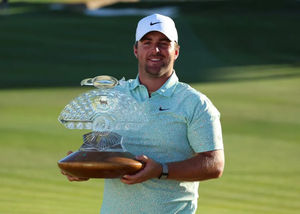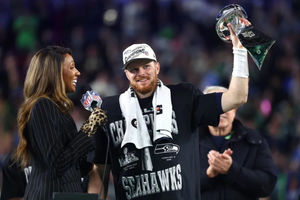Stories That Don't Suck: Mushnick When He Mattered, Erich Segal (OO MAH SOUL!), MLK

Every week, I'll excerpt a handful of stories — old and new, sports and otherwise, relevant and merely sublime — that I urge you to read for one reason or another. Send any suggestions to [email protected].

"Phil Mushnick's Dangerous Game: Work for Murdoch, Blast TV Schlock," by Nick Paumgarten (from The New York Observer, 1998) Suggesters readers: That one person who actually likes Phil Mushnick, Mike Francesa
Mr. Mushnick's penchant for nostalgia might be attributed to a childhood spent on Staten Island in the green, pure days before the Verrazano-Narrows Bridge linked the borough to Babylon. He was a sports fanatic early on. He served as a water boy who kept tackle charts for the Wagner College football team, which brought him his first brush with stardom. Former Jet head coach Rich Kotite, then Wagner's star tight end, once loaned him a windbreaker during a game. Now there was a true sportsman. Mr. Mushnick left Eden to attend Waynesburg College in southwestern Pennsylvania, where he cultivated a fondness for eccentric jocks and Quaaludes. Then, after graduating in 1973, he got a job as copy clerk at the Post, the only newspaper that would hire him. With the exception of a short stint at Newsday, he has been at the Post ever since. His disillusionment with the sports world came early. He covered the New York Rangers in the late 1970's and was assaulted by hockey hero Phil Esposito inside the locker room in response to a critical piece. Before that, Mr. Mushnick recalled, Mr. Esposito "told me not to stir up any crap. He told me that the guy I'd replaced was a homosexual. Then he told the guy who replaced me that I was a homosexual. That was the year I became an Islanders fan."

From the prologue to Mystery Train: Images of America in Rock 'n' Roll, by Greil Marcus (1975) Suggested readers: People for whom love means never having to say you're sorry
Our story begins just after midnight, not so long ago. The Dick Cavett Show is in full swing.
Seated on Cavett's left is John Simon, the New York Critic. On Cavett's right, in order of distance from him, are Little Richard, Rock 'n' Roll singer and Weirdo; Rito Moreno, Actress; and Erich Segal, Yale Professor of Classics and Author of Love Story. Miss Moreno and Mr. Segal adored Love Story. Mr. Simon did not. Little Richard has not read it.
Cavett is finishing a commercial. Mr. Simon is mentally rehearsing his opening thrust against Mr. Segal, who is very nervous. Miss Moreno seems to be falling asleep. Little Richard is looking for an opening.
Mr. Simon has attacked Mr. Segal. Mr. Segal attempts a reply but he is too nervous to be coherent. Mr. Simons attacks a second time. Little Richard is about to jump out of his seat and jam his face in front of the camera but Mr. Simon beats him out. He attacks Mr. Segal again.
"NEGATIVE! NEGATIVE NEGATIVE NEGATIVE!" screams Mr. Segal. He and Simon are debating a fine point in the history of Greek tragedy, to which Mr. Simon has compared Love Story unfavorably.
" 'Neg-a-tive,' " muses Mr. Simon. "Does that mean 'no'?"
Mr. Segal attempts, unsuccessfully, to ignore Mr. Simon's contempt for his odd patois, and claims that the critics were wrong about Aeschylus. He implies that Simon would have walked out on the Oresteia. Backed by the audience, which sounds like a Philadelphia baseball crowd that has somehow mistaken Mr. Simon for Richie Allen, Segal presses his advantage. Little Richard sits back in his chair, momentarily intimidated.
"MILLIONS OF PEOPLE WERE DEEPLY MOVED by my book," cries Segal, forgetting to sit up straight and slumping in his chair until his body is near parallel with the floor. "AND IF ALL THOSE PEOPLE LIKED IT —" (Segal's voice has no achieved a curious tremolo) "I MUST BE DOING SOMETHING RIGHT!"
The effort has exhausted Segal, and as he takes a deep breath Little Richard begins to rise from his seat. Again, Simon is too fast for him. Simon attempts to make Segal understand that he is amazed that anyone, especially Segal, takes his trash to be anything more than, well, trash.
"I have read it and reread it many times," counters Segal with great honesty. "I am always moved."
"Mr. Segal," says Simon, having confused the bull with his cape and now moving in for the kill, "you had the choice of acting the knave or the fool. You have chosen the latter."
Segal is stunned. Cavett is stunned. He calls for a commercial. Little Richard considers the situation.
The battle resumes. Segal has now slumped even lower in his chair, if that is possible, and seems to be arguing with the ceiling. "You're only a critic," he says as if to Simon. "What have you ever written? What do you know about art? Never in the history of art ..."
"WHY, NEVER IN THE HISTORY!"
The time has come. Little Richard makes his move. Leaping from his seat, he takes the floor, arms waving, hair coming undone, eyes wild, mouth working. He advances on Segal, Cavett, and Simon, who cringe as one man. The camera cuts to a close-up of Segal, who looks miserable, then to Simon, who is attempting to compose the sort of bemused expression he would have if, say, someone were to defecate on the floor. Little Richard is audible off-camera, and then his face quickly fills the screen.
"WHY, YES, IN THE WHOLE HISTORY OF AAAART! THAT'S RIGHT! SHUT UP! SHUT UP! WHAT DO YOU KNOW, MR. CRITIC? WHY, WHEN THE CREEDENCE CLEARWATER PUT OUT WITH THEIR 'TRAVELIN' BAND' EVERYBODY SAY WHEEE-OOO BUT I KNOW IT CAUSE THEY ONLY DOING 'LONG TALL SALLY' JUST LIKE THE BEATLES ANDTHESTONESANDTOMJONESANDELVIS — I AM ALL OF IT, LITTLE RICHARD HIMSELF, VERY TRULY THE GREATEST, THE HANDSOMEST, AND NOW TO YOU (to Segal, who now appears to be on the floor) AND TO YOU (to Simon, who looks to Cavett as if to say, really old man, this has been fun, but this, ah, fellow is becoming a bit much, perhaps a commercial is in order?), I HAVE WRITTEN A BOOK, MYSELF, I AM A WRITER, I HAVE WRITTEN A BOOK AND IT'S CALLED —
" 'HE GOT WHAT HE WANTED BUT HE LOST WHAT HE HAD'! THAT'S IT! SHUT UP! SHUT UP! SHUT UP! HE GOT WHAT HE WANTED BUT HE LOST WHAT HE HAD! THE STORY OF MY LIFE. CAN YOU DIG IT? THAT'S MY BOY LITTLE RICHARD, SURE IS. OO MAH SOUL!"
Little Richard sits with the arbiters of taste, oblivious to their bitter stares, savoring his moment. He is Little Richard. Who are they? Who will remember Erich Segal, John Simon, Dick Cavett? Who will care? Ah, but Little Richard, Little Richard himself! There is a man who matters. He knows how to rock.

"Martin Luther King Is Still on the Case!" by Garry Wills (from Esquire, 1968) Suggested reader: Whatever gremlin sneaked into Mike Greenberg's mouth and caused him to mangle Martin Luther King's name in the worst way possible
Bevel was the fourteenth, and last, speaker of the afternoon. It seemed that earlier emotional talks would have drained these men of all response left them after the shock of the preceding night. But Jim Bevel slowly built them up, from quiet beginnings, to an understanding of what it means to be "on the case." (This is a phrase he invented a year ago to describe musicians who are perfectly interacting; it is now an S.C.L.C. phrase of wide applicability.) "Dr. King died on the case. Anyone who does not help forward the sanitation workers' strike is not on the case. You getting me?" (They're getting him.) "There's a false rumor around that our leader is dead. Our leader is not dead." ("No!" They know King's spirit lives on — half the speeches have said that already.) "That's a false rumor!" (yes, they know, not dead; this is a form in which expectations are usually satisfied, the crowd arrives at each point with the speaker; he outruns them at peril of losing the intimate ties that slacken and go taut between each person in the room; but the real artist takes chances, creates suspense, breaks the rhythm deliberately; a snag that makes the resumed onward flow more satisfying) — "Martin Luther King is not our leader!" ("No!" The form makes them say it, but with hesitancy. They will trust him some distance; but what does he mean? The "Sho' nuff" is not declamatory now; not fully interrogatory, either; circumflexed.) "Our leader — ("Yes?) — is the man — ("What man?" "Who?" "Who?" Reverend Abernathy? Is he already trying to supplant King? The trust is almost fading) — who led Moses out of Israel." ("Thass the man!" Resolution; all doubt dispelled; the bridge has been negotiated, left them stunned with Bevel's virtuosity.) "Our leader is the man who went with Daniel into the lions' den." ("Same man!" "Talk some.") "Our leader is the man who walked out of the grave on Easter morning." ("Thass the leader!" They have not heard, here in hamboneland, that God is dead.) "Our leader never sleeps nor slumbers. He cannot be put in jail. He has never lost a war yet. Our leader is still on the case." ("That's it!" "On the case!") "Our leader is not dead. One of his prophets died. We will not stop because of that. Our staff is not a funeral staff. We have friends who are undertakers. We do business. We stay on the case, where our leader is."
It is the most eloquent speech I have ever heard.
Related
Why Alabama vs. Ohio State Must Happen as Scheduled
The NBA’s Tanking Problem Is Getting Worse — Not Better
NBA Picks Tonight: Three Best Bets Before the All-Star Break
- Best NBA Betting Picks for Wednesday Feb. 11th Slate
- Early Super Bowl LXI Odds Favor Seahawks, Sleeper Betting Picks & More
- Sunday Feb 8th NBA Picks: Three Best Bets Today
- Super Bowl Betting Preview: Seahawks vs. Patriots Breakdown & Pick
- The Most Fun Super Bowl Prop Bets You Can Make This Year
- Super Bowl 60 Prop Bets: 10 Best Bets for Patriots vs. Seahawks
- UFC Fight Night at the Apex Best Betting Picks and Predictions












